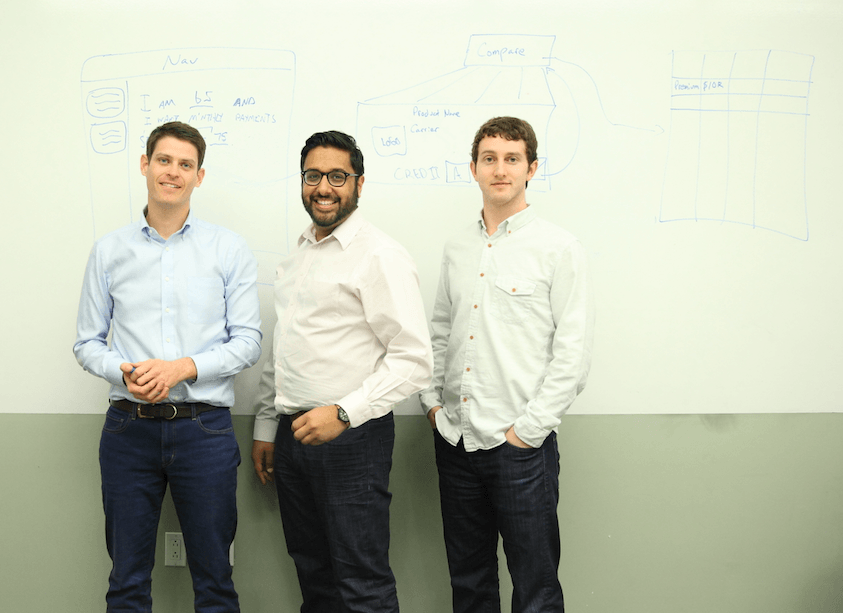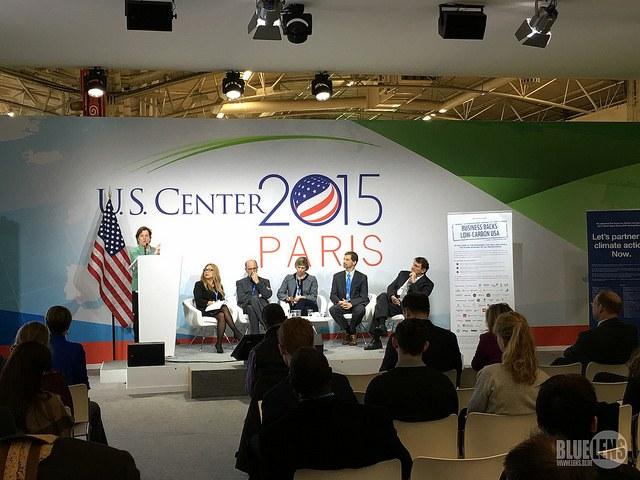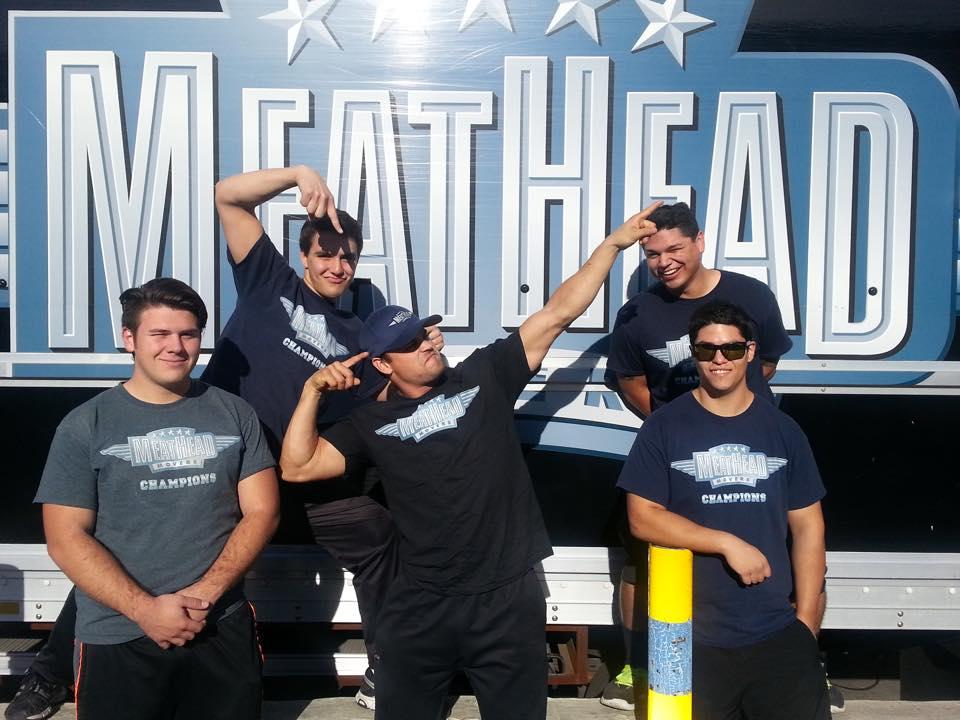This Startup is Helping Boomers Avoid Outliving Their Money


By Sarah McKinney
People are living longer than ever before: By 2050 the average life expectancy is 89 years old, and today there’s a woman living in the United States that’s 116 years old. The average age of retirement, however, is remaining relatively stagnant at 65. This means that older adults are now planning for more years without a paycheck, which can be stressful. Social Security helps, but typically only covers a portion of income lost, and reserves are expected to run out by 2034. Pension plans that used to be popular among employers, and that promised retirees a set monthly payment in the future, have been replaced with 401(k) offerings. This has transferred market risk and longevity risk from companies to individuals. The result? Many Americans are at risk of outliving their retirement savings.
Meet Matt Carey, CEO and co-founder of Abaris – a finance-tech startup that’s on a mission to make sure this doesn’t happen by increasing transparency in the annuities market and empowering 50- to 75-year-olds – through unbiased educational tools and personalized support – to decide whether or not it makes sense to include annuities in their retirement plan. Say what? If you think of annuities like a private market version of Social Security, you’re pretty close to understanding how they work – the amount you pay now is based on how much you want your set monthly payments to be in the future, kicking in at a pre-determined age and taking your other sources of future income (e.g., IRAs, 401(k)s, etc.) into consideration.
Launched in July of 2015, Abaris is the first direct-to-consumer online marketplace for annuity products, and the company is already seeing tens of thousands of monthly visitors. It partnered with eight of the 15 insurance providers that offer the annuity product it sells, and it's generating revenue through taking a 3- to 4-percent cut of insurance company profit – no additional fees are passed along to consumers.
I first crossed paths with Carey at the Kairos Global Summit, which took place in Los Angeles on Oct. 13 and brought together over 200 young entrepreneurs and 100 investors for a day of networking, roundtable conversations and keynote presentations. The 50 startups selected for this year’s K50 – a cohort of companies (with at least one founder under age 25) that are actively addressing complex challenges – each had a designated area where founders spent the morning giving demos and answering questions asked by passersby. The Abaris booth caught my eye given its focus on retirement and my interest in this segment of the population. After Carey explained what Abaris does – with zero reliance on unnecessarily confusing financial jargon – we scheduled time to speak by phone later in the week.
The idea for Abaris came when Carey was working on retirement policy at the U.S. Department of the Treasury, and trying to figure out what they should do now that fewer people have pension plans. His “a-ha” moment came after in-depth research revealed how stuck the current system was in an old paradigm due to its lack of transparency. Carey envisioned the technology needed to solve the problem. He started talking with his parents about their retirement planning, and began to realize how big the opportunity was to help people: There are currently 74.9 million baby boomers living in America, and by 2017 almost half of the U.S. adult population will be 50 or older. He left the Treasury to attend Wharton, where he met Abaris’ other two founders: Nimish Shukla (chief operating officer) and Adam Colombo (chief technology officer). He dropped out three-quarters of the way through to launch Abaris.
For naysayers wanting to argue that Abaris is doomed to fail given its reliance on baby boomers being tech-savvy, think again. A recent study by Pew Research Center reports that social media use among those 65 and older has more than tripled since 2010. Today, 35 percent of those 65+ use social media. A 2014 study by Nielsen found that, among baby boomers with at least $250,000 in liquid assets, 92 percent indicate online banking as their preferred channel for paying bills and 87 percent check their bank balances online. In 2012, people 66 and older spent an average of 25 hours a week online (WSL/Strategic Retail). In 2013, eMarketer reported that 9 in 10 baby boomers have made an online purchase.
Carey says his team spends a lot of time talking on the phone with users, and stresses the importance of education going both ways. “The psychological benefits of being able to count on an annuity payment in the future are huge,” Carey said, “and we learn so much from the older adults we speak with – about what their needs are, and their financial goals.”
Getting the remaining seven insurance companies on Abaris’ site is a near-term objective, but Carey says the company will also likely begin partnering with insurers to develop new, more flexible products. When asked what his vision of the future is, Carey said he wants everyone in their 30s and 40s to be aware of the option to purchase annuities when they get older, and for annuities to be an efficient asset class, just as stocks and bonds are. This, he said, will allow more people to make better-informed financial decisions when preparing for retirement, and ensure fewer people outlive their money.
Image credit: Abaris
Sarah McKinney is a freelance writer and Innovation Fellow at Encore.org. Follow her @sarahmck
Greeting card sellers under fire over poor sustainability disclosure


More than half (52%) of UK adults assume well-known businesses that sell greetings cards offer sustainable products made from well managed forests, a YouGov poll for WWF has revealed.
The British are the biggest card senders in the EU, and almost 2 in 5 (39%) buycards from specialist card retailers, but in WWF’s timber scorecard only one of the reviewed card sellers, Hallmark, scored highly on its sustainability policy and transparency for consumers. Card sellers like Paperchase and Clintons Cards received the lowest marks.
WWF highlights that despite the industry being worth an estimated £1.6bn at Christmas time alone, greetings cards are among the products not covered by the European Union Timber Regulation (EUTR), which is designed to keep illegally sourced timber out of the marketplace.
The regulation is currently under review by the European Commission in Brussels, and WWF has been campaigning to have ‘loopy loopholes’ closed, so that all goods that contain wood but are currently exempt from the EUTR, like books, cards, chairs and toys, are included.
Julia Young, WWF’s adviser on sustainable and legal timber trade, commented: “Consumers have told us time and again they want businesses to act responsibly and help them buy sustainably.
“Thousands of our supporters tweeted Paperchase and Clintons last week to try and persuade them to up their game. Clintons tweeted back that they are complying with the EU Timber Regulation, but say nothing about sustainability.
“Paperchase tweeted that they are sourcing from sustainable wood sources but we still can’t find any policy about this on their website, and they are not responding to our direct enquiries about this. For such well-known brands, they should be demonstrating leadership on this issue."
COP21 Delivers Historic Climate Agreement in Paris


I'm over Greenland headed home to San Francisco and just got the news that a strong climate agreement has been reached back in Paris. Peeking out the window to see ice caps brought a tear to my eyes, when I realized they don't actually have to melt.
We will share details on the agreement in the coming days. In the mean time here are some reactions from some NGOs who were official observers at the talks:
Kumi Naidoo, Executive Director, Greenpeace International: "The wheel of climate action turns slowly, but in Paris it has turned. This deal puts the fossil fuel industry on the wrong side of history."Jennifer Morgan, Global Director, Climate Program, World Resources Institute:
“It took hard work, grit and guts, but countries have finally united around a historic agreement that marks a turning point on the climate crisis. The Paris Agreement marks a new form of international cooperation – one where developed and developing countries are united by a common and fair framework. The agreement is both ambitious and powered by the voices of the most vulnerable."
Michael Brune, Executive Director, Sierra Club:
“The Paris agreement is a turning point for humanity. For the first time in history, the global community agreed to action that sets the foundation to help prevent the worst consequences of the climate crisis while embracing the opportunity to exponentially grow our clean energy economy. Decisive leadership and action from President Obama and other world leaders, an increasingly powerful climate movement, and strong progress in the U.S. and globally to move off coal cleared the way for every nation to come to the table.”
Of course the text isn't perfect (we'll have details on that on Monday) and implementation will be the real challenge and there are many uncertainties to be sorted out. But for now let's all enjoy a little hope and optimism.
Thank you, TriplePundit readers, and for supporting us! Your interest in topic of sustainability and business, and your ability to learn and share with your communities made a real impact in these talks. It was truly a global effort and we all deserve a pat on the back. Huzzah!
I'm off to hug my baby and think good thoughts about her future.
3p Weekend: Everything You Need to Know About COP21 -- Week 2


With a busy week behind you and the weekend within reach, there’s no shame in taking things a bit easy on Friday afternoon. With this in mind, every Friday TriplePundit will give you a fun, easy read on a topic you care about. So, take a break from those endless email threads and spend five minutes catching up on the latest trends in sustainability and business.
This morning, Nick Nuttall, coordinator of communications and outreach for the U.N. Framework Convention on Climate Change (UNFCCC), told the press that COP21 negotiations will continue into Saturday "to reach the best possible deal."
While we're waiting to see if the Paris talks will culminate in a long-awaited global agreement on climate change, let's catch up on all the big news of the week.
The Lima-Paris Action Agenda talks equitable smart cities
The COP21 climate talks in Paris run the gamut, as delegates, state and local governments, business and NGO leaders, and policy makers discuss everything from sustainable agriculture and forestry to divestment and climate finance.
But when we look decades into the future, it’s important to remember how our world will change. For example, in 1950, 30 percent of the world’s population lived in urban areas. By 2050, nearly 70 percent will call urban areas home. Our rapidly urbanizing world presents both challenges and opportunities, as the representatives from the Lima-Paris Action Agenda discussed at COP21.
Side conference tackles deforestation
While most of the attention in Paris is on what’s happening at COP21, dozens of other conferences, events and gatherings are taking place. One of the largest is the Global Landscapes Forum (GLF), where over 3,000 attendees looked at the scientific and policy implications of land use.
With agriculture alone accounting for over a quarter of global greenhouse emissions, the solutions they discussed may well be critically important to the success of COP21 on the other side of the city.
Attendees question fossil fuel sponsorship, funding of climate denial
The world is coming together to try to build a clean energy future, but the Paris climate talks are being bankrolled by the very companies that got us into this mess.
This is according to a new report from Corporate Accountability International, which found that four French companies sponsoring the climate talks – Engie, EDF, Suez Environment and BNP Paribas – are responsible for more than $15 billion invested in the coal industry; and more than 200 megatons of CO2 equivalent emissions – more than the yearly output of all but 20 countries.
Dozens of silent protesters took action at COP21, picketing an Engie-sponsored side discussion at the civil society space at Le Bourget in Paris. Many also stepped up to question fossil fuel companies' regular ploy of paying off academics to spout climate denial.
Oxfam expresses concern for small countries
On Tuesday morning in Paris, Oxfam Australia’s executive director, Helen Szok, issued the following statement about the ongoing COP21 negotiations: “Developing countries are at risk of being squeezed out of critical negotiations as the pace of talks intensifies. The small delegations of the poorest countries are being stretched, and it is vital that ministers ensure their voices are heard on critical issues like climate funding as the deadline for the Paris deal looms.”
TriplePundit sat down with Heather Coleman, who manages Oxfam America’s climate policy work, to find out more about the unique challenges facing delegations from small, low-income countries, and what that means for their ability to engage effectively with the negotiations in Paris.
Debates over loss and damage continue
“Loss and damage means when your preparation fails, or the disaster overwhelms your preparation, because the scale of the disasters is huge or you did not prepare on time,” said Harjeet Singh with Action Aid, adding that this is a major issue for developing countries, which are, mostly, pushing very strongly for the inclusion of loss and damage in the Paris agreement.
Climate Vulnerable Forum pushes for 1.5 degrees
Countries which, due to location, geography or size, are especially vulnerable have come together in Paris to form a powerful group pushing for a strong, binding agreement.
That group is the Climate Vulnerable Forum (CVF), made up of 43 member-countries, including more than 20 who joined at the onset of COP21. They are the true heroes of this COP, pushing for a 1.5-degrees Celsius limit on global temperature rise.
John Kerry announces $800 million for climate adaptation
In a speech on Wednesday afternoon, Secretary of State John Kerry said the United States will double its climate finance for adaptation to $800 million by 2020. The money will be used to help the world’s most vulnerable countries adapt to the impacts of climate change.As Kerry explained in his speech, it is a “moral responsibility to adapt and prepare for those impacts and enable the most vulnerable among us to do the same."
Companies adopt science-based targets
While the Paris climate talks drag on, 114 companies, including household names such as Dell, Sony, Ikea Group, Coca-Cola Enterprises, Walmart, General Mills and Kellogg, have gone above and beyond the COP21 climate goals to join the Science Based Targets initiative.
The world is funding fossil fuels to the tune of $436 billion
Some still argue that funding climate adaptation, mitigation and resilience is "too expensive." But what about that pile of cash we use to subsidize the fossil fuel industry?
How big is that pile? Bigger than you thought. In fact, a staggering $436 billion in subsidies is now being spent to prop up an old dirty industry that is smack dab in the middle of destroying the livelihoods of millions of individuals around the world.
Check out this infographic to learn more.
Latest draft text agreement drops on Thursday
The latest draft of the Paris Outcome was released on Dec. 10, seven hours late, but with, finally, some real changes in the text. Most notably, the most recent draft includes the goal of capping global temperature rise to 1.5 degrees Celsius -- which several delegations and organizations, like the 43-nation Climate Vulnerable Forum, favor over the original 2-degree target.3p correspondent Nithin Coca explains: "As we wrote about earlier this COP, climate finance is one of the most contentious issues, and thus far, the agreement includes several provisions previously agreed to, and a few positive changes. It’s not enough, but hopefully it means more will come."
Image credit: Mary Mazzoni
Will This COP Be the Legacy We've Been Waiting For?


By Teresa Fogelberg, Global Reporting Initiative
On the last day of COP21 I feel a bit sentimental. I'm usually too busy to take time to reflect and remember. But on this late Friday afternoon, while everyone is waiting for the culmination of the negotiations, I find myself wandering by the closed door of the G77 and China meeting room, the offices of the UNFCCC secretariat, and the hundreds of cameras lined up for the political breakthrough moment.
I can't help gliding off into daydreams about all the COPs I have attended throughout the years. Exactly 15 years ago I was in charge of the whole COP circus, and today I find myself an influencer, with [ed note: preferential] UN Observer status. In the years 2000 and 2001 the Netherlands held the COP6 and COP6bis presidency, and I was pulled out of my Foreign Affairs Directorship of the Research and Education department to become national Climate Change Director and Head of Delegation. I was suddenly in charge of the whole proceedings in The Hague, Lyon and Bonn. Since then I have organized many conferences, but never again did I have a €30 million budget. No corporate sponsorships were allowed, because at that time, business was the voice against climate. The UN Global Compact, WBCSD and GRI had just been created, and their collective pro climate voice was still weak against the strong anti UNFCCC lobby, spearheaded by the oil industry.
I had a delegation of 35 experts, almost all of them climate, forest, energy and legal experts. It was my task to pull all the technical sub-negotiations together, manage the EU coordination, and negotiate with G77, and other geopolitical giants like the U.S.
COP6 was about making the Kyoto Protocol happen, the first legally binding climate change regime, under the UN Climate Change Convention. Unfortunately, COP 6 was overshadowed by the U.S. election, where the week-long counting of the votes between candidates Al Gore and George W. Bush caused confusion and nervousness. The U.S. delegation, still under Clinton, was held hostage by 25 members of the U.S. congress, that came along to block any US ‘giveaways.’
Without failure there is no success!
So COP6 failed, on the night between Thursday and Friday, at 3 o'clock in the morning. That was a rare moment in my professional career that I broke into tears. After Christmas, I got a midnight call from the Dutch ambassador in Washington with the news that Kyoto was unlikely to succeed.
The second time I cried was six months later, in Bonn, at the end of COP6bis when almost all UN members defied the strong U.S. pressure, and voted for the Kyoto Protocol.
It was a great lesson to see that geopolitical power of the largest superpower does not always win. What I also learned is the extremely positive force of civil society and business, in making the unthinkable happen. The strongest allies for our cause as government negotiators were WWF, the climate coalition, as well as companies like BP and DuPont. It was business that invented the climate flexible mechanisms like CDM and carbon trading. That same year, the UN Global Compact was formed by Kofi Annan. And I discovered GRI as the first multi stakeholder framework through which companies could measure and report their sustainability impact. I was so impressed with the energy, creativity and power of these new initiatives, that I managed to get GRI to set up its headquarters in Amsterdam. I cut the umbilical cord with the government and joined GRI. The rest is history.
Now, 15 years later, I return to COPs with a different hat. I find that the task is more rewarding. Instead of endless negotiations and talks in informal and EU coordination, I spend my time influencing the outcome, through the value of GRI Standards. I can bring the perspective of the 6000+ reporting companies across 93 countries, and the many strategic partnerships with the UN, civil society, and business to have an impact on the outcome.
What strikes me now, compared to 15 years ago, is:
1. There is no longer a single overarching, legally binding UN framework, but a patchwork of extremely strategic initiatives, within the policy framework of the outcome document
2. There is much more focus on adaptation and the human dimension of climate change, as well as a better focus on the interconnectedness between climate change and the other global challenges, which are captured in the newly adopted Sustainable Development Goals
3. A strong focus on transparency, monitoring, reporting and verification, both of the governmental INDCs, the national emission reduction targets; as well as of the private sector contribution, positive or negative, to mitigation and adaptation; with a strong focus on the use of globally accepted standards like GRI Standards
4. And last but not least, a much more positive spirit. Finally, after so many years, those that have to close the deal, the key negotiating government delegations, don't hide behind skepticism but will commit to the Paris deal.
Enough dreaming. I'm off to soak up the anticipation of the final, final agreement.
See you next year in Marrakech!
Paris, 2020 and the Return of Bipartisan America


By Eban Goodstein
Much of the focus in the Paris climate talks has been on a process that supports deeper cuts in global warming pollution. Should the nations of the earth come back in five years with a new set of proposed reductions? The commitments now on the table have taken us half of the way there: from a business-as-usual global warming of 8 degrees Fahrenheit only a few years ago, down to a projected post-Paris warming of 6 degrees Fahrenheit by 2100.
To avoid catastrophic, runaway warming, we need to get that number down further, to 4 degrees Fahrenheit. But in reality, the road to deeper global warming pollution reductions depends little on the wording of the Paris agreement. Instead, it is a function of the evolution of domestic political appetite for further action, in particular, in the U.S., China and India, the biggest polluters. Will the politics line up for more aggressive policy steps supporting the 4-degree F target? And if so, how soon?
On first glance, prospects for more medium term action in the U.S. seem grim. As I discussed here, President Obama’s Paris pledge is rooted in a 45 year-old law, the Clean Air Act. Republicans in Congress, and Republican Presidential candidates, have vowed to undo the commitment if given the chance. So at best, a President Clinton is likely to execute successfully on the U.S. pledge, getting the nation on track for 30 percent reductions below 2005 levels by 2030. To do so, Clinton would have to fend off attacks on the policy from Tea Party politicians at both the federal and state level. Given the Tea Party lock on the House of Representatives, and the extraordinarily partisan nature of the current climate debate, major national climate or clean energy legislation in a Clinton first term seems out of the question.
And for any deeper cuts, new legislation will indeed be required. The EPA leaned very hard on the Clean Air Act in setting the Paris target. There will be no “Round 2” emerging under existing U.S. law in the next decade. Further U.S. action driven by new national legislation will therefore follow the elections of 2020. Or it won’t. The 2020 U.S. political contest will be a critical turning point in history, determining the American response to climate change, in turn driving the global response, and setting the course for the future of civilization on the Earth.
Is it possible to move beyond gridlock on climate? The rise of Tea Party politics in this decade can be traced in significant measure to Tea Party strength at the state-wide level in the 2010, off-year elections. Extreme gerrymandering post-2010 then created super safe districts for both Republicans and Democrats. Safe districts rewarded politicians, particularly on the Republican side, who represented radical voices in the party base. Post-2020 redistricting can undo this rigged election system and restore competitive elections, favoring moderation on both sides.
Back to Paris, and the process going forward. For America to take the next step on climate will require a post-2020 return to bipartisan policymaking on climate. By this, I mean 10-20 clean energy Republican votes in the House, and 5 in the Senate. Reasons for optimism about a post-2020 political realignment:
- U.S. elections in 2020 will coincide with a presidential race, favoring clean energy advocates who can dismantle the radical gerrymandering of 2010.
- The decline of the Tea Party base, and the rise of majority minority states and districts, driving politics towards the middle.
- Rapidly falling costs of clean energy Solar, wind, storage, and electric vehicles are increasingly affordable (and in the case of Tesla and BMW, sexy), making climate policy smart policy in red states and blue states.
- Green economic success With California, Germany, and other states and countries pushing the limit, and with car companies delivering on higher fuel economy, opponents of climate action will find it harder and harder to cry wolf on jobs versus the environment.
- Collapse of coal, low oil prices & stranded assets. The implosion of the coal industry in the last three years has brought home to investors the near-term reality of stranded assets in fossil fuel. With Saudi Arabia committed to pumping its oil as fast as possible, low gas prices will reduce the political clout of oil companies and petro-states, and also stall exploration for new reserves.
- The growing strength of a morally-based, American climate movement, making the case for the kind of action that science and justice demand. Watch for major post-Paris action from 350.org and other groups.
- Hotter and hotter planet More and more weather disasters.
All of these trends will move politics in a bipartisan direction, but ultimately, over the next five years, the Republican Party will need to regain centrist voices in purple states and districts. This scenario is most likely if Trumpisme implodes in an electoral disaster for Republicans in 2016—either with Trump as a candidate or following a deadlocked convention. The impact will cascade all the way down the ticket to state and local elections.
This is not a prediction, just a scenario. One could easily tell a story that extends climate gridlock in America well into the 2020s. However, the political landscape can change quickly. In 2006, Republicans controlled the Presidency and the Senate. In 2008, the reverse. Just seven years ago, the two major Republican Presidential candidates had both proposed major action on climate. Seven years from now, we may again see bipartisan support for further reduction in global warming pollution.
Regardless, from the perspective of Paris, the most likely path to American leadership within a five-year time frame involves electoral defeat for the Tea Party, enabling Republican centrists to regain their historic leadership on the environment once again. In the coming months, this means spending time registering voters and making phone calls with a dozen other volunteers in the dingy, strip mall office of your favorite clean energy candidate. Enjoy the pizza.
Eban Goodstein is an economist and is Director of the MBA in Sustainability and the Center for Environmental Policy at Bard College in Annandale-on-Hudson, NY.
Meathead Movers Goes Above and Beyond Helping Domestic Abuse Victims


Moving is never fun, in part because dealing with a moving company is not always the most pleasant experience. But when one has to move quickly, there may not be much of a choice, especially for those suffering from domestic violence.
According to the National Coalition Against Domestic Violence (NCADV), approximately 10 million people a year are physically abused by a spouse or partner in the United States, or one person every three seconds. Every nine seconds, a woman is assaulted or beaten.
For some of these victims, help is mercifully on the way thanks to Meathead Movers, a California moving company that has been in business for 18 years. The company was founded by two brothers, Aaron and Evan Sneed, who at one time were student-athletes trying to figure out how they could pay for their college tuition. What started as a small outfit manned by the Sneed brothers and some friends has since expanded to Los Angeles, Orange County and Fresno, California.
Employing student athletes exclusively, the company now runs about 5,000 moves a year and says it is the largest independent moving company in California. The company does not franchise and also insists it screens all of its employees thoroughly, from repeated interviews to extensive background checks.
One particular incident early in the company’s history inspired Meathead Movers to take on a problem that occurs still too often in our society. The company has a policy to help victims of domestic abuse move out of any dangerous situation -- for free. Partnering with seven domestic violence shelters, those suffering at the hands of a violent spouse or partner will receive help in moving where the company has operations, from Fresno as far south as San Diego. All of the shelters screen victims who request a free move, work with local law enforcement officials to ensure the move will occur as safely as possible, and work to ensure those needing to flee an abusive relationship are helped throughout the entire transition. And again, the move is completely free for the victim.
To raise awareness, Meathead Movers is participating in a national pledge drive to end domestic violence. Using the hashtag #MoveToEndDV, the company is active on social media channels including Twitter. Meathead Movers also encourages friends and family members to contact the company in event they have a loved one stuck in a dangerous situation and are not sure how they could help.
Between hiring students so that they can pay their way through school, and taking on a problem with which many of us are painfully aware, but are not sure how to stop, this ambitious company is going above and beyond corporate social responsibility and, in every sense, is a true social enterprise.
Image credit: Meathead Movers Facebook Page
Hundreds of B Corps are Sitting Ducks: Here's Why


Entrepreneurs who are growing the Certified B Corps movement need to learn from their elders' mistakes. But B Corps in 18 states are defenseless against corporate predators. And in 11 of these states, they're fooling themselves.
At the end of 2015, 31 states have passed laws establishing benefit corporations. These are different than Certified B Corps, which subscribe to a voluntary audit program maintained by a not-for-profit group called B Lab.
Benefit corporations have taken the next step by writing their double bottom line into their articles of incorporation. They exist to make a profit for their shareholders, but also to benefit their stakeholders—employees, suppliers, customers, and neighbors. In most states, benefit corporations are also required to prove their social impact in public reports.
The first law establishing benefit corporations was passed by Maryland in 2010. While the movement is spreading rapidly, 19 states have not yet passed a version of this law. But Georgia, Iowa, Kentucky, Maine, Missouri, New Mexico, North Dakota, Ohio, South Dakota, Wisconsin, and Wyoming have an older law on the books that some view as a substitute. It's known as a non-shareholder constituency statute, and it explicitly permits corporate directors to consider the effects of their decisions on stakeholders as well as shareholders.
Constituency statutes might sound good, but they don't protect mission-driven businesses. "They haven't been cited in many court decisions," says William Clark, an attorney who helped draft the original legislation for benefit corporations. "When push comes to shove, the shareholders always win. So there's a real question at this point about what constituency statutes mean." And thereby hangs a tale.
The current crop of community-minded business people emerged when baby boomers started opening shops in the 1970s. The founders of Ben & Jerry's, The Body Shop, Tom's of Maine, Stonyfield Yogurt, and others succeeded by positioning their products as healthy, values-led alternatives to similar products made by big, greedy corporations. But when the big, greedy corporations offered to buy them out, the hippie capitalists couldn't come up with a better alternative.
In the 1980s and 1990s, most corporate managers and lawyers gleefully took cover behind Milton Friedman and other "free market" economists. The actor Michael Douglas captured this slimy worldview in 1987, in the movie Wall Street, with his Oscar-winning portrayal of the corporate raider Gordon Gekko. "Greed, for lack of a better word, is good," said Gekko. "Greed is right. Greed works. Greed clarifies, cuts through, and captures the essence of the evolutionary spirit."
Gekko's speech came on the heels of Revlon v. MacAndrews, a Delaware Supreme Court decision that triggered a feeding frenzy among corporate predators. The Court held that once buyers begin bidding up the price of a publicly traded stock, corporate directors must disregard the interests of stakeholders and focus only on maximizing shareholder profits. The Revlon decision never made it to the US Supreme Court, and lawyers are still arguing about it. But for years after passed in 1986, it was accepted as the law of the land.
Lots of community minded business people were horrified by Gekko and Revlon. They devised constituency statutes to give corporate directors a way to fight back. Pennsylvania was the first state to pass one, in 1983. Others followed quickly and today, 32 states have them on the books.
But this wasn't really a legal dispute. It was a clash of worldviews, and the community capitalists never had a chance. The directors of Ben & Jerry's were forced to sell to Unilever in 2000, even thought the Vermont legislature passed a constituency statute in 1998. One big reason for the sale (described in my book) was the threat of multiple lawsuits from profit-hungry shareholders.
"With the exception of Connecticut, constituency statutes are not mandatory," says Clark. "They simply allow directors to consider other interests." In other words, constituency statutes codify a large body of corporate law that says directors have the right to serve stakeholders as well as shareholders. But this legal right doesn't mean much, once the money starts talking.
Constituency statutes were the best we could do until the late 2000s, when Clark and several others developed a better idea. Benefit corporations are legally required to pursue a double bottom line. They build enormous amounts of good will and loyalty by treating their employees, suppliers, customers, and neighbors well. They are also publicizing their good works as a way of distinguishing themselves from their competition. Many benefit corporations are highly profitable for this reason.
If a profit-only corporation buys a benefit corporation, it could always change the charter or absorb the assets. But in many cases, a move like that would also endanger the very thing that makes the acquisition attractive.
Changing a benefit corporation's policies runs a serious risk of losing a lucrative market segment. This is because so many consumers will pay more for products that reflect their commitments to fair trade, a living wage, and other causes. These activist consumers are the ultimate guardians of the socially responsible business movement. Benefit corporations are their best choice, because benefit corporations are finding ways to grow sustainably without abandoning their stakeholders.
Image credit: Flickr/Brandon Lally
Policy Points: How Business Can Influence Taxes, Clean Water and Workplace Issues


By Zach Bernstein
Voluntary corporate sustainability initiatives and social enterprises are essential but are not game-changers by themselves. In addition, we need laws and regulations that guide our economy toward sound, long-term decision-making, with full recognition of social and environmental externalities. As business leaders, we can and must support policy changes to help make the economy more sustainable.
A sustainable economy will depend on policies that will help advance change on a societal level. Here are three important policies that can do that:
1. Oppose tax inversions
Last month, New York City-based Pfizer announced it would merge with Ireland-based Allergan, in a deal rumored to be worth $160 billion. The new combined company would be reincorporated in Ireland to take advantage of lower tax rates, even though Pfizer’s operations would likely remain based primarily in the United States. This tactic is known as a tax inversion. Pfizer had also attempted the same maneuver with AstraZeneca last year, but that deal ultimately fell through. Other companies, like Burger King, proceeded with their own inversions last year.
What’s at stake: While it’s unclear how much money Pfizer will be saving under this plan, the numbers for other inversion deals have been staggering. By one estimate, Burger King will be able to avoid $117 million in US taxes with its purchase of Canada-based Tim Horton’s. This money is revenue that won’t be available to pay for important services that all businesses – including those using inversions – rely on, like infrastructure, public safety, and the legal system. In order to make up the lost revenue, services would have to be cut, or taxes would have to be raised on smaller businesses that do not have the resources or desire to pursue inversions.
What you can do: Currently, the tax code is rife with loopholes that allow businesses to shift profits – or their headquarters – overseas to avoid paying federal taxes. Inversions cut into the tax base, stretching budgets and forcing other companies or consumers to pick up the slack. Join the American Sustainable Business Council and Main Street Alliance and show that your business is proud to be an American company.
2. Show your support for the Clean Water Rule
Last month, several ASBC members, including New Belgium Brewing, Small Business Minnesota and the Sustainable Business Network of Philadelphia, went to Capitol Hill to urge Congress not to block the EPA’s Clean Water Rule. The meetings, hosted by ASBC and the Natural Resources Defense Council (NRDC), represented the latest business effort in support of the rule, including testimony before congressional committees and op-eds in support of the rule.
Why? Even though the rule was finalized in May of this year, following a seven month-long comment period that yielded over a million responses , Congress has attempted to block the rule’s implementation.
What’s at stake: The list of sectors that rely on clean water to operate is massive. Losing access to that resource can have devastating effects on local economies; one spill in West Virginia last year cost $19 million a day. That helps explain why, in national, scientific polling released by ASBC last year, 80 percent of small business owners said they supported rules to protect upstream headwaters, as the Clean Water Rule would do.
What you can do: To fend of attacks, in both Congress and the courts, the business community must continue to speak out in support of the rule, and protecting clean water as an economic necessity. Show your support for the EPA’s Clean Water Rule.
3. Raise your voice for paid sick days, nationally and locally
Progress on paid sick days continues across the country. Last month, two New Jersey towns became the latest to pass paid sick days measures – 84 percent of voters in the town of Elizabeth voted in favor of a ballot measure which would extend paid sick days to 25,000 workers, while the Jersey City Council voted to expand their existing law, which will cover about 30,000 more workers. The latter was the first paid sick days law passed in the Garden State in 2013.
What’s at stake: By one estimate, businesses lose $227 billion each year to lost productivity due to illnesses, either when people stay home sick or come in even though they’re sick. Doing that runs the risk of getting other employees or customers sick, while making it more likely that workers will not be able to do their best work – and will prolong their illness. At the very least, it reduces consumer spending, which our economy depends on. Rather than having employees come in when they’re not at their best, businesses should support moves to let workers stay home, recover, and come back refreshed.
What you can do: Earned sick days legislation, the Healthy Families Act, has been reintroduced in Congress; it would allow workers to earn up to seven sick days, getting an hour of earned sick time for every 30 hours worked. Show Congress that as a business person, you think this makes good business sense by supporting earned sick day legislation.
Image credit: Flickr/Oatsy40
Zach Bernstein is Manager of Research and Social Media for the American Sustainable Business Council.
Unicef report highlights importance of post-COP21 action for children


As COP21 draws to a close, international children's charity Unicef has called for ambitious action on climate change.
“The future of today’s children, particularly the most disadvantaged, is at stake,” said Unicef Executive Director Anthony Lake, speaking at an event at the 21st United Nations climate change conference in Paris. “Sadly, we are failing them. Because today’s children are disproportionately bearing the brunt of the effects of our changing climate. They are paying for our failure with their health and safety. With their futures. And too often, with their lives.”
A Unicef report ‘Unless we act now – The impact of climate change on children’ points out that climate change brings more droughts, floods, heatwaves and other severe weather conditions, which contribute to the increased spread of major killers of children such as malnutrition, malaria and diarrhoea. The report also shows that over half a billion children live in areas where floods are extremely frequent, and thus are highly exposed to climate change. Many of those children are in countries with high levels of poverty.
“We can no longer allow our collective inaction on climate change to perpetuate a vicious cycle that condemns the most disadvantaged children to lives with little hope, at the mercy of disasters beyond their control,” Lake said.
In addition to cutting emissions, steps need to be taken to reduce inequities among children, Lake said, citing the need for investments in health and other essential services and in basic infrastructure that can withstand climate-related disasters.
“The path the world chooses here in Paris will indelibly mark humanity’s future,” Lake said. “History will judge us. And most importantly, our children will — and should — judge us for our stewardship of the planet they will inherit.”
Lake was speaking at an event jointly hosted with the Organisation for Economic Co-operation and Development (OECD), which featured discussions amongst civil society and young people about ways to reduce the impact of climate risks on the most vulnerable children.